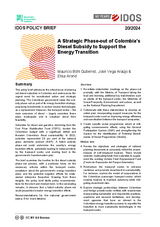Policy Brief
A strategic phase-out of Colombia’s diesel subsidy to support the energy transition
Böhl Gutierrez, Mauricio / José Vega Araújo / Elisa ArondPolicy Brief (20/2024)
Bonn: German Institute of Development and Sustainability (IDOS)
DOI: https://doi.org/10.23661/ipb20.2024.v2.0
2nd, revised edition
The 1st edition is no longer available.
Span. Ausg. u.d.T.:
Hacia una eliminación progresiva y estratégica del subsidio al ACPM en Colombia
(Policy Brief 25/2024)
This policy brief addresses the critical issue of phasing out diesel subsidies in Colombia and underscores the urgent need for coordinated action and strategic planning. The Colombian government views the subsidy phase-out as part of its energy transition strategy, proposing investments in carbon-neutral technologies as a replacement. However, the transport sector – the main consumer of diesel – largely considers these plans inadequate and is sceptical about their feasibility. Subsidies for diesel and gasoline, stemming from the Fuel Price Stabilisation Fund (FEPC), burden the Colombian budget with a significant deficit and threaten Colombia’s fiscal sustainability. In 2022, subsides represented 2.5 per cent of the national gross domestic product (GDP). A failed subsidy phase-out could undermine the country’s energy transition efforts, potentially leading to national strikes by the transport sector and eroding trust in the government’s transformation plan. The brief examines the hurdles for the diesel subsidy phase-out process, with a particular focus on the necessary reforms within the transport sector, scepticism about the government’s energy transition plans and the potential negative effects for state-owned enterprise Ecopetrol. Drawing from these insights, the policy brief distils policy recommendations for the short and medium term. In the concluding remarks, it stresses that a failed subsidy phase-out could jeopardise broader energy transition efforts.
Recommendations for the national government (see p. 5 for more details):
Short term
1. Re-initiate stakeholder meetings on the phase-out promptly, with the Ministry of Transport taking the lead and involving additional key stakeholders such as clients of the transport sector, the Ministries of Social Prosperity, Environment, and Labour, as well as the National Planning Department.
2. Collaborate with these stakeholders to develop an action plan, incorporating support measures for the transport sector such as improving energy efficiency and coordination between the transport companies. 3.
3. Create specific social programmes aimed at mitigating socioeconomic effects, using the Participatory Guarantee System (SPG) and strengthening the System for the Identification of Potential Beneficiaries of Social Programmes (Sisbén).
Medium term
4. Review the objectives and strategies of national planning documents to accurately reflect the circumstances of self-employed truckers. These should consider reallocating funds from subsidies to supplement the existing Vehicle Fleet Replacement Fund (Fondo de Reposición del Parque Automotor).
5. Restructure the transport sector to enhance resilience and promote investment in sustainability. For instance, explore the model of cooperatives in the Colombian passenger transport sector, which enables truckers to maintain autonomy while mitigating investment risks.
6. Explore strategic partnerships between Colombian and foreign private-sector entities with experiences incorporating sustainable and responsible practices, academia and research institutions, and development agencies that have an interest in the Colombian energy transition process to expedite the transition to more sustainable technologies in the transport sector.
Kontakt
Cornelia Hornschild
Koordinatorin Publikationen
E-Mail Cornelia.Hornschild@idos-research.de
Telefon +49 (0)228 94927-135
Fax +49 (0)228 94927-130
Alexandra Fante
Bibliothekarin/Open Access-Koordinatorin
E-Mail Alexandra.Fante@idos-research.de
Telefon +49 (0)228 94927-321
Fax +49 (0)228 94927-130




